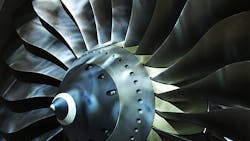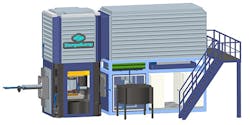Process Breakthrough for Forging Lighter Turbine Blades
Leistritz Turbinentechnik GmbH recently ordered two 8-MN isothermal forging plants for titanium aluminide turbine blades, to be designed and supplied by Siempelkamp. The first press will start production in March 2016, the second in 2017.
According to Siempelkamp, Leistritz will use these forging presses to manufacture a new generation of aircraft engines, incorporating material that is 50% lighter than the nickel-base alloys now commonly used for turbofan aircraft engines, with comparable material strength as those alloys. The difference is intended to enhance aircraft fuel efficiency to a significant extent.
Titanium aluminide (TiAl) alloys are intermetallic chemical compound that are high in density, lightweight, and heat-resistant. The material’s ductility has been a problem for product designers though, one that has begun to be address by aerospace (and automotive) designers only in recent decades.
As detailed by Siempelkamp, TiAl’s intermetallic structure is the basis for its high strength and excellent creep resistance at high temperatures. That, as well as the material’s lightness (the density is 4 grams per cubic meter) make it well suited for aircraft engine components. The material provides the potential to reduce the weight of turbine blades for aircraft engines by up to 50%, according to the forging machinery developer; its strength-to-weight characteristics also provide a significant reduction of centrifugal forces within the aircraft engine. Naturally, a lighter aircraft engine design will contribute decisively to reduced fuel consumption.
Leistritz, which forges turbine components at its plant in Remscheid, Germany, has been a development partner to aircraft engine manufacturers for decades, helping to finalize designs in high-strength materials like high-temperature steels, titanium, and nickel-based alloys. It supplies turbine blades as forged blanks, or as finished structures ready for installation.
While intermetallic titanium aluminide had long been considered "unforgeable," Leistritz concludes that forging can initiate a re-crystallized structure that casting cannot achieve, one that is necessary for safety in rotating engine parts. In addition, forging offers higher process stability than casting, meaning the turbine blades conform to aircraft manufacturers’ very high quality requirements.
Leistritz has developed a forging process wherein blanks can be formed without cracks under carefully defined conditions at 1,150-1,300°C. The high forming temperature and the long dwell time of the forgings in the die, due to forming speeds of less than 0.1 mm/s, make it necessary to preheat the tools to forging temperature.
The extremely low press speeds require hydraulic drive control to be especially accurate and uniform. Special guide and sealing systems ensure uniform compression, thus avoiding the stick-slip effect.
The symmetrical press design, with a cross thread guide located on the outside, allows for high precision forging. Because the guide elements are isolated from the heat source there is no thermal influence on the guide.
The large distance between the guidance elements and the high rigidity of the press frame also contribute to precisely opposite aligned upper and lower dies during the forging process.
Leistritz has operated a Siempelkamp 50-MN isothermal forging press since 1984. Because of its satisfaction with that system, Leistritz contacted Siempelkamp to evaluate different process concepts for the new titanium aluminide blade production program.
During pilot production, engineering talks were started concerning the design of the new isothermal line. At the start of 2014 both companies cooperated to develop the requirement profile for the plant allowing, series operation.
In November 2014, Leistritz commissioned Siempelkamp to develop and build two manufacturing plants for series production of titanium aluminide turbine blades.
Because the molybdenum contained in the dies sublimates in open air at temperatures over 600°C, oxygen has to be prevented from entering the dies. Therefore, the entire plant will be enclosed, which allows a completely automatic process — from inserting of the blank at room temperature to unloading of the forged turbine blades — all within an inert gas atmosphere.
Siempelkamp is supplying both presses from a single source. The scope of supply for both presses includes a rotary hearth furnace, a loading manipulator, the forging press, the tool heating system, the hydraulic drive system, and the complete electrical control package. Process controls will monitor and document all process parameters according to the certification standards in the aircraft industry.
About the Author
Robert Brooks
Editor/Content Director - Endeavor Business Media
Robert Brooks has been a business-to-business reporter, writer, editor, and columnist for more than 20 years, specializing in the primary metal and basic manufacturing industries. His work has covered a wide range of topics including process technology, resource development, material selection, product design, workforce development, and industrial market strategies, among others.
Currently, he specializes in subjects related to metal component and product design, development, and manufacturing—including castings, forgings, machined parts, and fabrications.
Brooks is a graduate of Kenyon College (B.A. English, Political Science) and Emory University (M.A. English.)


